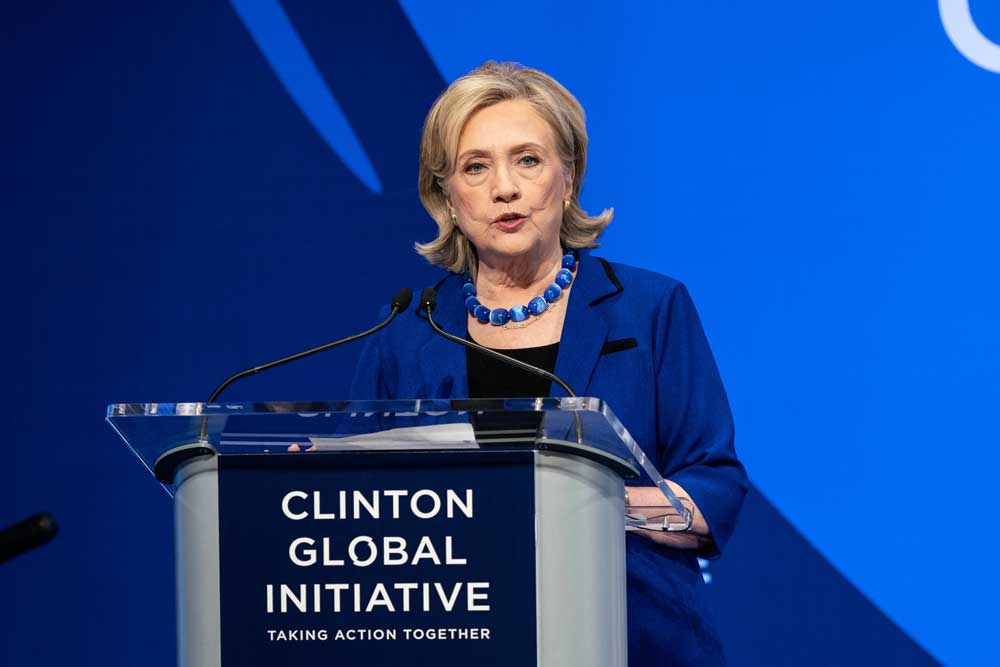Hillary Clinton is more than just a name - she represents a symbol of resilience, leadership and a lifetime dedicated to public service. From her humble beginnings in Arkansas to her remarkable journey to becoming a prominent figure on the national and global stages, Hillary Rodham Clinton has left an indelible mark on American political history. In this blog, we delve deeper into the multifaceted biography of Hillary Clinton, unravelling the layers of her early life, her illustrious political career, and the lasting legacy she continues to shape in society.
Early Life
Hillary Diane Rodham was born on October 26, 1947, in Chicago, Illinois. Raised in a middle-class household, she was the eldest of three children. Her father, Hugh Rodham, was a prosperous textile business owner, and her mother, Dorothy Howell Rodham, was a homemaker. Hillary's parents instilled in her the values of hard work, perseverance, and public service. She excelled academically and was deeply influenced by her mother’s stories of overcoming personal hardships.
During her high school years at Maine South High School, Hillary was a standout student, participating in student council and the school newspaper. Her drive and dedication earned her a place at Wellesley College, where she graduated with honours in 1969. At Wellesley, Hillary’s leadership skills shone brightly; she became the first student in the college’s history to deliver the commencement address. Following her undergraduate studies, she attended Yale Law School, where she met her future husband, Bill Clinton.
Early Involvement in Politics
Hillary Clinton’s political journey began during her college years. At Wellesley, she was active in student politics and participated in campaigns advocating for civil rights and social justice. Her commitment to these causes continued at Yale Law School, where she worked with the Children’s Defence Fund, a nonprofit organisation advocating for children's rights.
After graduating from Yale in 1973, Hillary moved to Arkansas, where she joined the faculty of the University of Arkansas School of Law. Her engagement in politics deepened as she worked on campaigns and initiatives that addressed education, children's welfare, and legal aid for the underprivileged. It was in Arkansas that she reconnected with Bill Clinton, who was beginning his own political career.
In 1974, Hillary became a member of the impeachment inquiry staff advising the House Committee on the Judiciary during the Watergate scandal. This role not only honed her legal acumen but also solidified her reputation as a formidable legal mind dedicated to upholding justice and integrity.

First Lady of Arkansas
When Bill Clinton was elected as the Governor of Arkansas in 1978, Hillary Clinton assumed the role of First Lady of Arkansas. She used this platform to champion various causes, particularly those related to education and healthcare. Her initiatives included chairing the Rural Health Advisory Committee and the Arkansas Educational Standards Committee, where she worked to improve the quality of education and healthcare in the state.
Hillary's efforts led to significant reforms, such as the introduction of mandatory teacher testing and the development of a statewide educational curriculum. Her work earned her national recognition, and in 1983, she was named Arkansas Woman of the Year. Throughout her tenure as First Lady of Arkansas, Hillary balanced her professional career at the Rose Law Firm with her public service, demonstrating her ability to manage multiple demanding roles effectively.
First Lady of the United States
In 1993, Hillary Clinton became the First Lady of the United States when Bill Clinton was elected President. As First Lady, she redefined the role by taking on more active and policy-driven responsibilities. One of her most ambitious projects was leading the Task Force on National Health Care Reform. Although the initiative ultimately did not pass, it highlighted her commitment to comprehensive healthcare reform and brought national attention to the issue.
Hillary also advocated for the rights of women and children, both domestically and internationally. She delivered a landmark speech at the Fourth World Conference on Women in Beijing in 1995, famously declaring, "Women's rights are human rights." Her tenure as First Lady was marked by her advocacy for education, children's health, and economic opportunities for women.
United States Senator
After her husband’s presidency, Hillary Clinton launched her own political career by running for the U.S. Senate seat from New York in 2000. She won the election, becoming the first female senator from New York. During her tenure, she focused on issues such as healthcare, national security, and veterans' benefits. She was a staunch advocate for the state of New York, particularly in the aftermath of the September 11 attacks, securing funding for the recovery and rebuilding efforts.
As a senator, Hillary served on several important committees, including the Armed Services Committee. Her legislative accomplishments included efforts to improve health benefits for National Guard members and to enhance medical research funding. She was re-elected in 2006, continuing her work on key issues affecting her constituents and the nation.
Secretary of State
In 2009, President Barack Obama appointed Hillary Clinton as the 67th Secretary of State. In this role, she was instrumental in shaping U.S. foreign policy during a time of global challenges. Her tenure was marked by her focus on ‘smart power,’ which combined military strength with diplomacy and global partnerships.
Hillary Clinton played a pivotal role in navigating complex international issues, including the Arab Spring, the conflict in Libya, and the US pivot to Asia. She championed the use of technology and social media as tools for diplomacy and was a strong advocate for human rights, women’s rights, and economic development. One of her notable initiatives was the creation of the Global Health Initiative, which aimed to improve healthcare worldwide, particularly for women and children.
Her diplomatic efforts earned her praise and recognition globally, and she travelled extensively to strengthen US’ relationships with other nations. Hillary’s tenure as Secretary of State solidified her reputation as a skilled diplomat and a formidable leader on the world stage.
Presidential Candidate
Hillary Clinton’s most publicised role came in 2016 when she became the Democratic nominee for President of the United States. This historic candidacy made her the first woman to be nominated for president by a major US political party. Her campaign focused on issues such as economic reform, healthcare, education, and gender equality.
Despite winning the popular vote by nearly three million votes, Hillary Clinton lost the electoral college to Donald Trump. Her campaign faced significant challenges, including controversies surrounding her use of a private email server during her time as Secretary of State, and the investigation that followed. Nevertheless, her candidacy broke significant barriers for women in politics and inspired millions around the world.

Conclusion
Hillary Clinton's journey is not just a narrative of personal achievement; it is a testament to the enduring power of resilience, determination, and unwavering dedication to the greater good. Throughout her life, she has navigated the complexities of politics with grace and tenacity, never wavering in her commitment to advancing the causes she holds dear.
From her early days as an activist to her historic candidacy for the presidency, Hillary has remained steadfast in her belief that change is possible and that progress requires persistence. Her leadership has inspired millions around the world to believe in the power of their own voices and to fight for a more inclusive and equitable society.
As we reflect on Hillary Clinton's remarkable journey, we are reminded of the transformative impact that one individual can have on the course of history. Her legacy will continue to shape the future of American politics and inspire generations to come to stand up, speak out, and work towards a brighter tomorrow.
In the annals of American history, Hillary Rodham Clinton's name will be forever etched as a beacon of hope, resilience, and unwavering commitment to the principles of democracy and social justice. Her story serves as a reminder that, despite the challenges we face, the pursuit of a better world is always worth fighting for.
FAQs
What is Hillary Clinton’s full name?
Her full name is Hillary Diane Rodham Clinton.
When was Hillary Clinton born?
She was born on October 26, 1947.
What are some key achievements of Hillary Clinton as Secretary of State?
As Secretary of State, she focused on ‘smart power’ diplomacy, human rights, women's rights, economic development, and initiated the Global Health Initiative.
Did Hillary Clinton win the 2016 Presidential Election?
Hillary Clinton won the popular vote but lost the electoral college to Donald Trump.
What were Hillary Clinton's major contributions as First Lady of Arkansas?
As First Lady of Arkansas, she worked on education reform, chaired the Rural Health Advisory Committee, and the Arkansas Educational Standards Committee.